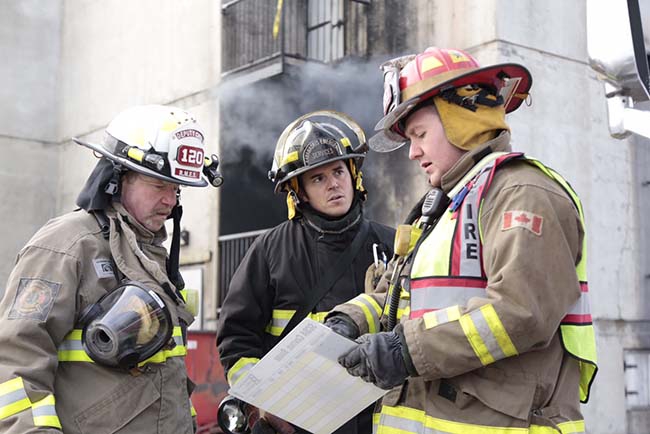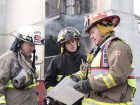
Features
Leadership
Professional development
Most of us who wear stripes understand that mentoring is a critical component in the development of firefighters and newly promoted officers.
November 2, 2016
By Denis Pilon
 Denis Pilon discusses the importance of mentoring up-and-coming leaders
Denis Pilon discusses the importance of mentoring up-and-coming leadersThrough my research and experiences, I’ve compiled some best practices that departments can use to implement mentoring programs.
There’s little information available about how to mentor up-and-coming leaders: most textbooks have two or three paragraphs about the need to find a mentor, the need for a formal mentoring program, or the need for mentors to be identified in advance of the need.
Some textbooks give the impression that a mentor relationship could go on indefinitely, that anyone could be a mentor or mentee, that a formal process is best but not necessary, and that a mentor must be the same rank or higher than the mentee. However, none of these textbooks provide any how-to instructions for mentoring.
The mentoring process should take place over a short period of time, typically six to nine months, depending on the position and past experience of the new person. Typically, this is a growth period, as the newly promoted firefighter learns the ropes and makes decisions that are foreign to his or her experience; it is a time during which the mentee can build confidence and try new things, learn new processes and make changes to the way things have been done. The formal mentoring should be brief, but the resulting relationship will thrive for many years and encourages the mentee to continue to ask for advice.
■ Building a program
A formal mentoring program allows the department to pre-screen mentors to ensure they have the right experience, knowledge, skills and abilities, but most importantly, to ensure they have the right attitude. Mentors aren’t teachers; they are coaches and guides.
A good mentor relationship will ensure that the mentor and mentee meet regularly, such as weekly. The meetings can be brief or more lengthy depending on the issues that need to be discussed. The meetings should be face to face or by phone or teleconference, but definitely not by email or social media.
The meetings should have a set format, beginning with a discussion of items from the last meeting. The mentor should lead the discussion by asking open questions such as: What were the results of the decisions that you made? Was there any positive or negative feedback? What did you learn? Next is a discussion of the new issues the mentee faces. Again, the mentor should ask questions: What are your options? Which is the best option? What are you going to do? It is not the mentor’s role to offer solutions or tell the mentee which solution is best: the mentor’s role is to bring out the possibilities and let the mentee make the decision.
The mentor needs to use probing questions such as: Have you thought of this? Have you considered how this will affect the crews? Have you considered the political implications of that decision? It is not the role of the mentor to lay out the positive and negative effects of the decision, but to ensure that the mentee has thought through them.
Next, the mentor should ask what the mentee sees on the horizon – what issues are about to come to the forefront? How can the mentee deal with those issues? Can the issues be resolved before they become problems? This is the proactive portion of the mentoring process.
■ Know the boundaries
A good mentor will step in only if the mentee is about to make a critical error that could be illegal, immoral, cause injury or harm to an individual, or harm the reputation of the organization. If intervention is necessary, it is still not the mentor’s role to make the decision, but to guide the mentee to the right decision.
Be aware that the mentee may not do the job or make the decision the way the mentor would do it, and may do so worse or better. Remember, growth comes from making mistakes. If the mentee is making a mistake, as long as no harm will come from it, the mentor must let it go; he or she will grow and so will the mentor.
A mentor does not need to be the same rank or a higher rank than the mentee, nor does he or she need to be in the same fire department or even in the fire service.
If you have promoted a new administrative chief who will be responsible for the budget, it would be wise to have that person mentored by someone in the municipal finance section who understands the budget procedure, including where the revenue comes from, how mill rates are set and how council reacts to the proposed budget. You may also know of someone from another municipal department who is an expert in areas such as vehicle maintenance. Find a range of experts to mentor your people.
■ Build relationships
One of the most significant benefits available to members of Canadian fire services is the opportunity to meet and share best practices at conferences, meetings and social events. People lead much more mobile lifestyles than we did 20 years ago and, as a result, more members can attend these functions provincially, nationally and internationally.
Chief fire officers should make an effort, through their participation in conferences and other events, to meet people from other regions and departments who have experience and skills, and include them in their mentoring networks.
People who don’t make mistakes aren’t learning and they certainly aren’t trying anything new. The key to good mentoring is to allow the mentee to learn something new without getting into serious trouble.
If the person makes a mistake, critique the decision and the results, discuss what could have been done differently, look at other options, make corrections and move on. There is an old business adage that leaders who take considerable risks can be expected to make two major mistakes in their careers and business leaders who take no risks can be expected to make two major mistakes in their careers. The biggest mistake fire-service leaders can make is not taking risks but still making as many mistakes as those to do take risks. Take the risk – you will be surprised by the results.
The post-mentor relationship will go on for years. I have served in the fire service for more than 30 years and there are people from across Canada and the United States who I can call on any time and ask for advice; I also regularly receive calls from people I’ve met over the years, and with whom I’ve developed relationships, asking for my advice.
Receiving and giving advice is not part of the mentorship program, but is a result of building a network of people who are informal mentors for each other. This network starts with your first mentor relationship and will build over the years to include people from all sizes and configurations of fire departments. These people are your best resources when things are challenging. Don’t be afraid to ask for advice or help, just remember you may have to offer your help to someone else someday.
Finally, the best part of being a mentor is learning from your mentees. Recognize and applaud new and better ways of doing things. Be the first to adopt a new process that a mentee developed. Hold your head high and give credit where credit is due.
Your biggest reward will be when you are retired and no longer active in the service and you can look at those you mentored and witness them mentoring the next generation of chief officers.
Denis Pilon is the chief of the Swift Current Fire Department in Saskatchewan and is the chair of the CAFC’s resolutions, bylaws and constitution committee. Contact him at d.pilon@swiftcurrent.ca and follow him on Twitter at @DMPilon
Print this page

